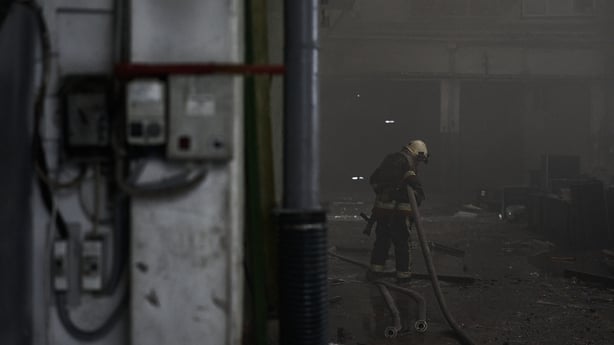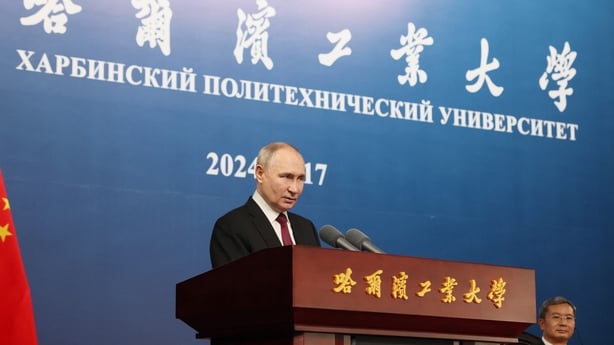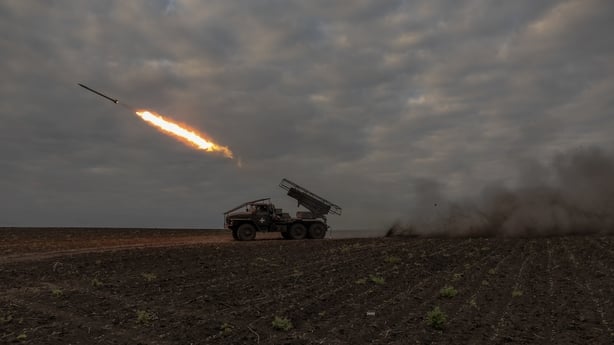Russian guided bombs have killed at least three people and injured 28 in the northeastern Ukrainian city of Kharkiv, Mayor Ihor Terekhov said on Telegram.
Regional Governor Oleh Syniehubov had earlier put the death toll at one, with four of the injured in serious condition.
Kharkiv, Ukraine's second largest city, and the surrounding region have long been targeted by Russian attacks.
The strikes have become more intense in recent months, hitting civilian and energy infrastructure.
Ukraine President Volodymyr Zelensky has accused Moscow of seeking to reduce the city to rubble.
Meanwhile Ukraine's top commander warned of "heavy battles" looming on the war's new front in the northeastern Kharkiv region as Russian President Vladimir Putin said Moscow was carving out a "buffer zone" in the area.
Russian forces attacked the region's north last Friday, making inroads of up to 10 kms and unbalancing Kyiv's outnumbered troops who are trying to hold the line over a sprawling front nearly 27 months since the invasion.

Colonel-General Oleksandr Syrskyi said the attack had expanded the combat zone by around 70km and that Russia had launched its incursion ahead of schedule after "it noticed the deployment of our forces".
"We understand there will be heavy battles and that the enemy is preparing for that," the head of the Ukrainian armed forces wrote in a statement on the Telegram app.
Russian forces have the initiative on the battlefield and are slowly advancing in the east, exploiting Ukrainian shortages of manpower and months of delays in arms supplies from the West.
Speaking during a state visit to China, Mr Putin said Russia was creating a "buffer zone" in Ukraine's northeast to protect its own border regions, but said capturing the city of Kharkiv, Ukraine's second largest, was not part of the current plan.

Faced with Russian airstrikes throughout the war, Kyiv has scrambled to develop drones and missiles and staged strikes on facilities in Russia it says are being used to help bomb Ukrainian towns, cities and power facilities.
Mr Putin told a news conference in China that the assault on Kharkiv region was a response to Kyiv's shelling of Russian border regions such as Belgorod where he said civilians were dying.
"They are shooting directly at the city centre, at residential areas, and I said publicly that if this continues, we will be forced to create a security zone, a buffer zone. That is what we are doing," he said.
Russian forces were able to advance 10 kms in one place in Kharkiv region, although Ukrainian forces have "stabilised" the front, President Volodymyr Zelensky told Ukrainian media outlets in comments published today.
Moscow's troops have captured 12 villages during the current incursion, Russia's defence ministry said.
Russia is staging its heaviest assaults in the eastern Donetsk region, according to data compiled by the Ukrainian General Staff, which said the Pokrovsk front had faced the most regular assaults in recent days.
Mr Syrskyi said Ukrainian forces were also preparing defensive lines for a possible Russian assault on the Sumy region, which would mark another front more than 100 km to the north of Kharkiv.
We need your consent to load this rte-player contentWe use rte-player to manage extra content that can set cookies on your device and collect data about your activity. Please review their details and accept them to load the content.Manage Preferences
Kyiv says Russia has small units of forces near the Sumy region.
"We note that the actions (of Russian forces) are systematic," said Volodymyr Artiukh, head of the Sumy region's military administration.
"Shelling continues, in fact, along the entire border, with an intensity of 200-400 explosions per day... The intensity of enemy sabotage groups has increased," he said.
An expanding front is particularly challenging for Ukraine at a time when its military is in need of replenishment.
Mr Zelensky signed a law allowing some categories of convicts to serve in the army, parliament's website showed.
The move provides only a potential maximum 20,000 people who could join the army, Kyiv officials say. Mr Zelensky also signed into law tougher fines for draft dodging.
Russian officials said that Ukraine had mounted an unusually large wave of overnight drone attacks, killing two people in Belgorod region and setting fire to an oil refinery at Tuapse on the Black Sea.
The attacks, a Ukrainian intelligence source said, targeted an electricity substation in occupied Crimea, an oil depot and railway station in Russia's Black Seaport of Novorossiysk as well as the Tuapse refinery.
Russia conducted its own long-range attack on Ukraine overnight, but Kyiv's military said it shot down all 20 incoming drones over the regions of Kharkiv, Poltava, Vinnytsia, Odesa and Mykolaiv.

A Russian missile attack damaged civilian infrastructure and injured at least five people in Ukraine's southern Odesa region, the regional governor said.
Three people were hospitalized, Oleh Kiper added on the Telegram messaging app.
"In the Odesa district, a heavy fire occurred at the site," he said.
Ukraine's air force said Russia had launched at least four missiles, and local chats reported a series of powerful explosions.
Russian troops also attacked the region overnight with drones that Ukraine said it had downed.
Separately, US commercial satellite company Maxar said imagery showed that a long-range Ukrainian strike on the Moscow-controlled Belbek airbase in Crimea destroyed three Russian warplanes and a fuel facility near its main run way this week.
EU bans distribution of four Russian news outlets
The European Union has said it was suspending the distribution of four Russia-linked media outlets in the EU, despite a warning from Moscow this week that any such move would draw swift retaliation.
The ban applies to Voice of Europe, RIA Novosti news agency and Izvestia and Rossiyskaya Gazeta newspapers, on the grounds that they "have been essential and instrumental in bringing forward and supporting Russia's war of aggression against Ukraine", the European Council said in a statement.
The measure is part of a planned 14th package of sanctions against Russia over its 2022 full-scale invasion of Ukraine. The bloc has previously imposed sanctions on Russian state-owned media Russia Today and Sputnik.
The EU had signaled the move earlier this week, prompting Russian Foreign Ministry spokeswoman Maria Zakharova to warn: "We will respond with lightning speed and extremely painfully for the Westerners." It was not clear how Moscow would hit back.
In an interview with Izvestia, the head of the international department of the Russian Union of Journalists (RUJ) called the EU ban "unlawful" and said the matter should have been decided by a court.
Timur Shafir said the ban would prevent Russian-speakers living in parts of Europe once under Soviet control from accessing what he called "alternative information" on world events.

